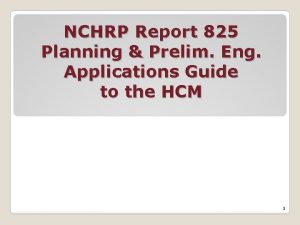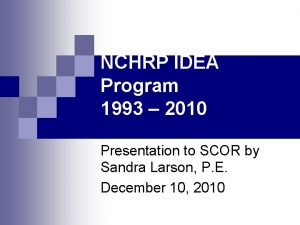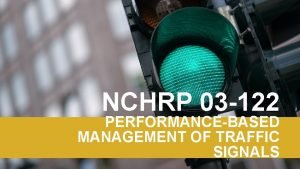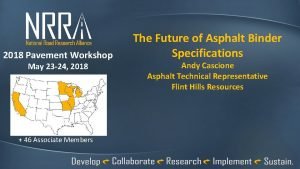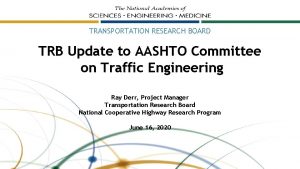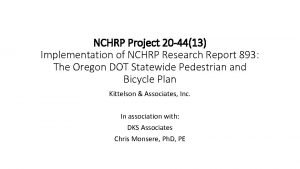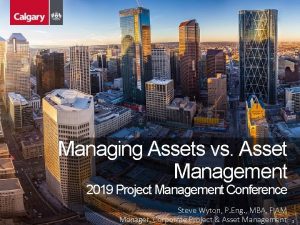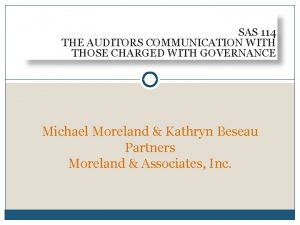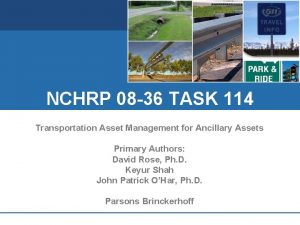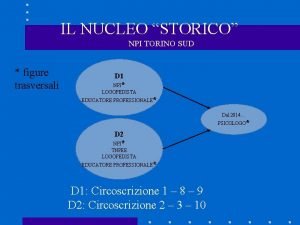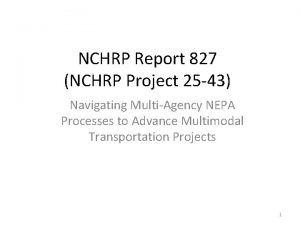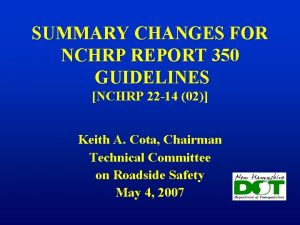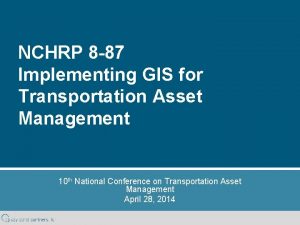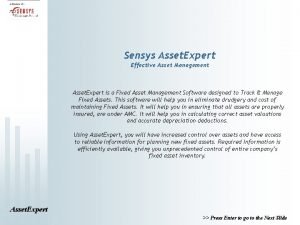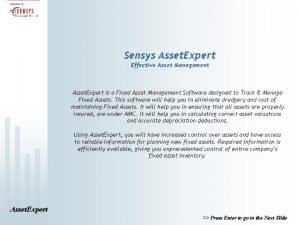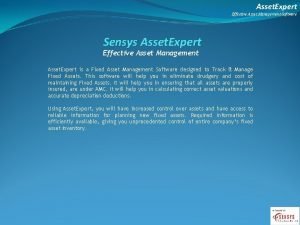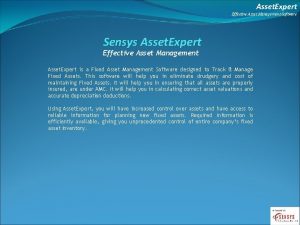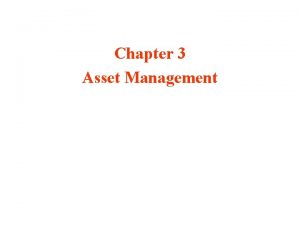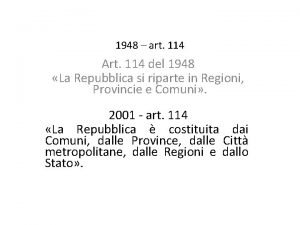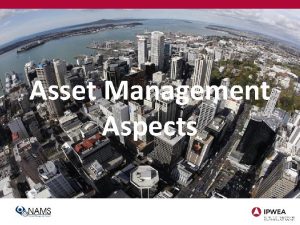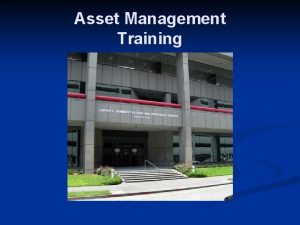NCHRP 08 36 TASK 114 Transportation Asset Management

















- Slides: 17

NCHRP 08 -36 TASK 114 Transportation Asset Management for Ancillary Assets Primary Authors: David Rose, Ph. D. Keyur Shah John Patrick O’Har, Ph. D. Parsons Brinckerhoff

Overview • Project Approach – Project Tasks • Asset Classification Hierarchy – Assets Selected for Focus • State-of-the-Practice • Life Cycle Management Principles • Integrating Ancillary Assets into Enterprise Asset Management Systems • Results – Sample guidance template for High Mast Light Poles • Next steps 2 | Transportation Asset Management for Ancillary Assets

Project Approach • Provide information to serve as a starting point to approach asset management for ancillary assets – Classification hierarchy for ancillary assets – Identification of how the life cycle management of ancillary assets can be incorporated into enterprise asset management systems – State-of-the-practice for asset management of a subset of ancillary assets – Recommended life cycle management business processes for the subset of ancillary assets 3 | Transportation Asset Management for Ancillary Assets

Project Tasks Task 1: Project Kickoff Meet with project panel Task 2: Develop Classification Hierarchy for Ancillary Assets Review prior NCHRP studies Assess prior frameworks and develop standard hierarchy Task 3: Document Ancillary Asset Lifecycle Management Practices Select volunteer DOTs for surveys Analyze state of practice Task 4: Identify Best Practices Use survey results, prior research, and the team's knowledge to identify best practices Task 5: Final Report Analyze results of survey Compare best practices and state-of-the-practice 4 | Transportation Asset Management for Ancillary Assets Identify linkages with asset management systems

Asset Classification Hierarchy Asset Class Asset Elements Asset Sub-Elements (if Applicable) Drainage Structures (not bridges or otherwise in the national bridge inventory) Overhead Sign and Signal Structures Retaining walls (Earth retaining structures) Noise barriers High Mast Light Poles Signals Traffic Control & Management – Active Devices ITS Equipment Network Backbone 5 | Transportation Asset Management for Ancillary Assets Signals, beacons, flashers, ramp meters Cameras, variable message signs, detection devices/sensors, highway advisory radios Hubs and nodes, fiber, cabinets, software

Asset Classification Hierarchy Continued Asset Class Traffic Control & Management – Passive Control Devices Asset Elements Signs Barrier Systems Drain Inlets and Outlets Asset Sub-Elements (if Applicable) Regulatory and warning signs Guide, service and attraction signs Guardrails, barrier walls, cable barriers, end treatments, impact attenuators Drains, drop inlets, catch basins, gutters Culverts (< 20 ft)/Pipes Drainage Systems and Environmental Mitigation Features Ditches Environmental Mitigation Features (Storm Water Retention Systems) Other Drains Other Safety Features Roadside Features Paved and unpaved ditches Slotted drains Lighting Sidewalks Curbs 6 | Transportation Asset Management for Ancillary Assets ADA ramps

Ancillary Assets Selected for Further Focus • Culverts (<20 ft. )/Pipes • Drainage Systems and Environmental Mitigation Features – Drain Inlets/Outlets; Ditches; Storm Water Retention Systems; Other Drains • Overhead Sign and Signal Structures • High Mast Light Poles • ITS Equipment – Cameras; Variable Message Signs; Detection Sensors/Devices; Highway Advisory Radios • Network Backbone – Hubs and Nodes; Fiber; Cabinets; Software • Sidewalks and Curbs 7 | Transportation Asset Management for Ancillary Assets

State-of-the-Practice • Internationally-accepted standards for the management of physical infrastructure assets (ISO 55000 and PAS 55) • Considerable body of knowledge related to the management of pavements and bridges in the U. S. • Passage of MAP-21 resulted in new asset management requirements – primarily focused on pavement and bridge assets • Much of the literature on ancillary asset management captures state-of-the-practice • Generally no industry standards for the management of ancillary roadway assets 8 | Transportation Asset Management for Ancillary Assets

Life Cycle Management Principles • Project team used the terminology and elements of asset management as outlined in PAS 55 and ISO 55000 • Management system (ISO 55000): a set of interrelated or interacting elements of an organization to establish policies and objectives, and processes to achieve those objectives • Asset management information (PAS 55): meaningful data related to assets and asset management • Asset management information system (PAS 55): a system for the storage, processing, and transmission of asset management information 9 | Transportation Asset Management for Ancillary Assets

Key Elements for Asset Management 10 | Transportation Asset Management for Ancillary Assets

Asset Life Cycle Stages and Key Decision Points 11 | Transportation Asset Management for Ancillary Assets

Integrating Ancillary Assets into Enterprise Asset Management Systems 12 | Transportation Asset Management for Ancillary Assets

Template for Life Cycle Management Business Process Guidance • Enterprise-level – Inventory – Interaction between Asset Classes – Relationship of Asset Class to Overall Safety, Mobility, and Asset Performance • Asset Specific-level – – – Inspection and Condition Assessment Level of Service/Performance Metrics Lifecycle Management Plans and Practices Asset Prioritization Decision Support • Additional Sections – Asset Element-specific Considerations – Additional References 13 | Transportation Asset Management for Ancillary Assets

Sample Template – High Mast Light Poles • Asset Element-specific Considerations – Provide proven improvement to nighttime driving conditions – Height presents challenge for inspections • Enterprise-level – Inventory • Recommended complete inventory with basic data items including location, condition, and age – Interaction between Asset Classes • Failure can result in closure of crucial links in the highway system – Relationship of Asset Class to Overall Safety, Mobility, and Asset Performance • Provide illumination that can improve safety 14 | Transportation Asset Management for Ancillary Assets

High Mast Light Pole Template • Asset Specific-level – Inspection and Condition Assessment • • Visual inspections with binoculars or telescopes Remotely-operated inspection devices with video cameras NDT techniques to inspect base plates and anchor rods Inspect at least every 4 to 5 years – potentially greater frequency for anchor bolts which are known to loosen over time – Level of Service/Performance Metrics • Typically simple condition rating scale comparing current performance against originally intended function – Lifecycle Management Plans and Practices • Track maintenance activities and forecast future activities such as anchor bolt tightening, repair, or replacement • Account for need to replace lamps – Asset Prioritization • After high-wind weather events prioritize inspections • Prioritize inspections in areas with known nighttime safety issues – Decision Support • Track maintenance costs to inform future needs estimates • Estimate remaining service life based on installation date and age 15 | Transportation Asset Management for Ancillary Assets

High Mast Light Pole Template Continued • Additional References – Garlich, M. J. & Thorkildsen, E. T. , 2005. Guidelines for the Installation, Inspection, Maintenance and Repair of Structural Supports for Highway Signs, Luminaries, and Traffic Signals, Washington, D. C. – Sheth, P. N. & Montie, D. , 2005. Integrated Light Maintenance and Inspection System for High-Mast Poles, Charlottesville, VA. – Goyal, R. , Dhonde, H. B. & Dawood, M. , 2012. Fatigue Failure and Cracking in High Mast Poles, Houston, Texas. 16 | Transportation Asset Management for Ancillary Assets

Next Steps • Results of this research provide a foundation to develop TAMPs for a subset of ancillary assets • Further research needed to developed generally accepted standards for the management of ancillary assets, particularly for: – – Culverts Drainage Systems and Environmental Mitigation Features Network Backbone Sidewalks and Curbs 17 | Transportation Asset Management for Ancillary Assets
 Pseudocolor image processing
Pseudocolor image processing Nchrp 659
Nchrp 659 Nchrp 825
Nchrp 825 Nchrp idea
Nchrp idea Udot atspm
Udot atspm Nchrp 23-24
Nchrp 23-24 Nchrp 926
Nchrp 926 Nchrp 20-44
Nchrp 20-44 Asset management vs project management
Asset management vs project management Tiered task bias task
Tiered task bias task Csit 114
Csit 114 Sas 114 letter example
Sas 114 letter example Phys 250 ubc
Phys 250 ubc Taskj-114
Taskj-114 Who wrote psalm 114
Who wrote psalm 114 Po odparowaniu wody ze 114 g roztworu nasyconego
Po odparowaniu wody ze 114 g roztworu nasyconego Crm 114 discriminator
Crm 114 discriminator Figure equicomposte
Figure equicomposte


